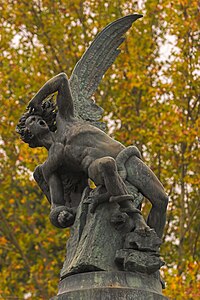Fallen angel
From Wikipedia, the free encyclopedia

In most Christian traditions, a fallen angel is an angel that has been exiled or banished from Heaven.
Often such banishment is a punishment for disobeying or rebelling against God. The best-known fallen angel is Lucifer. Lucifer is a name frequently given to Satan in Christian belief. This usage stems from a particular interpretation, as a reference to a fallen angel, of a passage in the Bible (Isaiah 14:3-20) that speaks of someone who is given the name of "Day Star" or "Morning Star" (in Latin, Lucifer) as fallen from heaven. The Greek etymological synonym of Lucifer, φωσφορος (phosphoros, "light-bearer")[1] [2] is used of the morning star in 2 Peter 1:19 and elsewhere with no relation to Satan. But Satan is called Lucifer in many writings later than the Bible, notably in Milton's Paradise Lost (7.131-134, among others), because, according to Milton, Satan was "brighter once amidst the host/Of Angels, than that star the stars among."[3]
Contents |
[edit] Prospects for Salvation
According to the Catechism of the Catholic Church, angels were all created good but some turned bad on their own.[4] Angels don't need faith as they already have the knowledge of celestial things, so their rebellion against God constituted unforgivable sin.[5] Mat 12:32 qualifies unforgivable sin as being unforgivable in "this age or the age to come", although not all Christians interpret this to mean that those who have committed this sin may be redeemed after the passage of two ages. [6] A tradition stretching back as far as Gregory of Nyssa and Origen has taught that the devil and fallen angels will eventually be saved. [7] [8]
[edit] References
- ^ http://scripturetext.com/2_peter/1-19.htm.
- ^ http://www.etymonline.com/index.php?term=phosphorous.
- ^ http://www.online-literature.com/view.php/paradiselost/7?term=lucifer.
- ^ The Catechism of the Catholic Church, Number 391. http://www.vatican.va/archive/catechism/p1s2c1p7.htm#II
- ^ The Catechism of the Catholic Church, Number 393. http://www.vatican.va/archive/catechism/p1s2c1p7.htm#II
- ^ David Watt "Is Hell Closed Up & Boarded Over?" by David Watt, Feb 1999, New Oxford Review, http://www.newoxfordreview.org/article.jsp?did=0299-watt
- ^ "Universalism Asserted", by Thomas Allen, available on amazon or as free ebook at Total Love in Christ Ministries http://www.tlchrist.info/tallin.htm
- ^ "Satan" By Jeffrey Burton Russell, on google books http://books.google.co.uk/books?id=gxwR74_cpx4C&printsec=frontcover&dq=Jeffrey+Burton+Russell
[edit] Source
- This article incorporates text from the public-domain Catholic Encyclopedia of 1913.
- "Angels", Catholic Encyclopedia, 1913.
- "Catholic Encyclopedia". New Advent. http://www.newadvent.org/cathen/01476d.htm.
[edit] Bibliography
| Wikimedia Commons has media related to: Fallen angels |
- Ashley, Leonard. The Complete Book of Devils and Demons Barricade Books. ISBN 1-56980-077-4
- Bamberger, Bernard Jacob, (March 15, 2006). Fallen Angels: Soldiers of Satan's Realm, 300pp. ISBN 0-8276-0797-0
- Davidson, Gustav, 1994. A Dictionary of Angels: Including the Fallen Angels. Free Press. ISBN 0-02-907052-X

